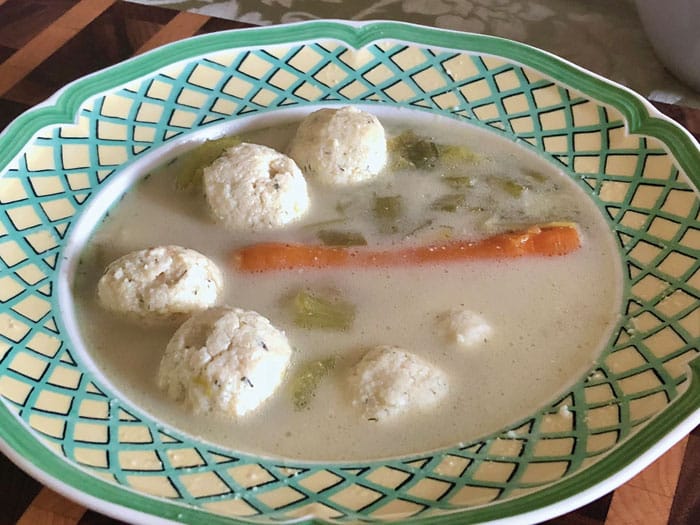
Judaism is packed with food customs. Passover is no exception.
“The Seder itself overflows with traditional foods, recipes passed down through families and desserts that evoke our childhoods,” Michael Tanenbaum, founder of the website Consciously Kosher, told the Journal. “Then it’s literally eight days of eating [those same foods].”
The problem is that many of the traditional Passover foods are simply not healthy for many people.
Perhaps you have dietary restrictions due to a preexisting health condition. Maybe excessive matzah, and processed store-bought Passover food, mess with your system. Or, you just might tend to overeat.
But this Passover, it doesn’t have to be this way. Did you know there are ways to eat healthy during the holiday?
Tanenbaum said it’s as simple as avoiding the “bad” foods and eating tons of the “good” foods. Here’s how he breaks it down:
The “bad” foods: The four main ingredients to avoid on Passover are foods with cottonseed oil, MSG, white sugar and potato starch. Potato starch foods in particular are devoid of nutrients and will spike your blood sugar.
Specifically, avoid all jarred gefilte fish (cottonseed oil, potato starch, MSG), soup mixes (MSG), Bissli (MSG), mayonnaise (cottonseed oil), potato chips (cottonseed oil) and nearly all kosher l’pesach yogurts, which have dozens of grams of sugar per serving. Passover cereals, like Crispy-O’s, have a very high simple carbohydrate and sugar content, and those infamous candied fruit slices are full of sugar, dyes and artificial flavors.
Hint: Read the ingredient labels very carefully. Avoid any products that contain cottonseed oil, MSG, white sugar and potato starch.
The “good” foods are those that are in their natural form, such as fruits, vegetables, almond flour and quinoa. Minimally processed foods, like certain yogurts and cheese, are also good. Keep in mind thatsome healthy foods don’t require Passover certification, while others do.
If you’re Ashkenazi, there’s an astonishing array of fruits and vegetables that can be eaten that are not kitniyot. If you’re Sephardic, then you are even luckier, because you can eat rice, beans and tons of other healthy ingredients, like amaranth and buckwheat.
Rather than buying processed and premade foods, you can make your own gefilte fish, soup stock, pastries, macaroons and other desserts. You can even make your own mayonnaise using avocado oil. It takes 10 to 15 minutes.
Hint: Time is not infinite, so you can’t make everything yourself. But even tackling a few of these can transform your health and your holiday.
If you are gluten-free, try oat matzah. Also, there are a lot of familiar foods you can make with almond flour or coconut flour.
Two years ago, my wife and I came up with Passover sliders. The little buns are made of almond flour and psyllium. They really mimic the texture of real bread. Along with the savory cumin-flavored burgers, a slice of avocado, some lettuce and a handful of bell peppers, it’s a delightfully fun meal.
To go healthy this Passover, Tanenbaum suggests going light on matzo products, as well as Passover foods in general. Instead, eat lots of fresh fruits, vegetables and nuts.
“Rather than seeing healthy food as yet another restriction in a holiday filled with them, this is an opportunity to explore new ways of eating that will carry forth into the rest of the year,” Tanenbaum said.
For more tips and food guides, download Tanenbaum’s “Consciously Kosher Guide to Passover” ebook on ConsciouslyKosher.com/passover-ebook.
The Matzo Ball, Reinvented (with Almond Flour)
2 cups almond flour (not almond meal)*
4 eggs
1/8 cup water (optional: use club soda for more fluffiness)
1/2 tsp dill weed
1/2 tsp dried mint leaves
1/2 tsp Himalayan salt
1/2 tsp garlic powder
*Please note: The flour used in this recipe is the Kirkland brand from Costco. Brands vary in consistency. It also matters whether the product is almond flour or almond meal.
In a medium bowl, beat eggs with all ingredients except almond flour. Stir in almond flour.
Refrigerate for 30 minutes to an hour.
Wet your hands with a little bit of water. Shape batter into 1-inch balls.
Add balls to a pot of cooking chicken soup about 20 minutes before the soup is done. Let simmer for 20 minutes.
Initially, the flavor will feel unfamiliar. Let the experience sink in. It is liberating.























 More news and opinions than at a Shabbat dinner, right in your inbox.
More news and opinions than at a Shabbat dinner, right in your inbox.